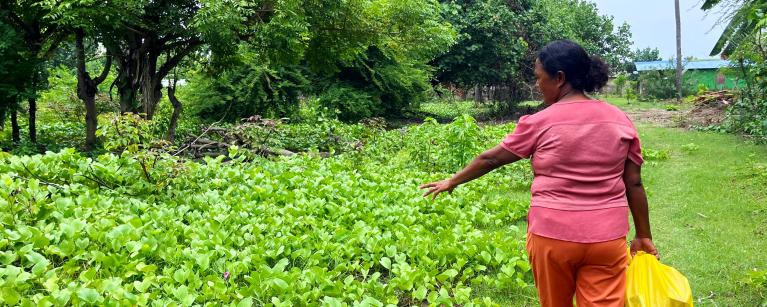Across Timor-Leste, women are on the frontlines of the climate crisis—grappling with the intensifying impacts of cyclones, floods, droughts, and environmental degradation. A new report, Women’s Experiences of Climate Change Impacts in Timor-Leste, produced by Oxfam in Timor-Leste in partnership with Alumni Parlamentu Foinsa’e Timor-Leste (APFTL) and Core Group Transparency (CGT), sheds light on the harsh realities and invisible burdens faced by women—especially those in rural communities in Dili, Ermera, and Manatuto.
The findings show that climate change is not gender neutral. Women face compounded vulnerabilities, often balancing the responsibilities of caregiving, food production, and economic recovery in the wake of disasters. Cyclone Seroja in 2021 exemplified the destructive force of climate events, displacing thousands, damaging farmland, and plunging families into long-term insecurity. Women like Manuela Rosario Soares and Teresa Pereira shared moving accounts of how they navigated crises with resilience, despite minimal institutional support.
The report also documents the psychological toll on women, the heightened risks of gender-based violence during displacement, and the challenges women with disabilities face in emergency situations. Structural barriers—such as insecure land tenure, discrimination, and exclusion from decision-making—further intensify these risks. For example, many women are unable to access recovery subsidies because land titles are often held by men, or because they live in informal or prohibited areas.
Yet, despite these challenges, women emerge as powerful agents of resilience. The report highlights how women form savings groups, manage agroforestry initiatives, organize disaster preparedness plans, and step into leadership roles. These contributions are often overlooked, under-resourced, or unsupported by formal systems. Even as women demonstrate leadership and adaptability, they continue to face obstacles accessing climate finance, infrastructure, and platforms for decision-making.
In response, the report calls for stronger gender-responsive policies, inclusive planning processes, and direct investment in women-led initiatives. It emphasizes that to truly build climate resilience in Timor-Leste, the unique knowledge, roles, and needs of women must be recognized and supported at all levels—from government to community-based organizations.
This research is part of the Kōtui Programme, a partnership between Oxfam Aotearoa and the New Zealand Ministry of Foreign Affairs and Trade. Kōtui aims to strengthen the resilience, wellbeing, and agency of women in the face of climate breakdown and disaster, particularly for those facing multiple layers of marginalization.
Women’s Experiences of Climate Change Impacts in Timor-Leste is not only a report—it is a testament to the strength of Timorese women and a call to action to build a more just and inclusive response to the climate crisis.
